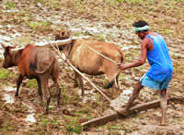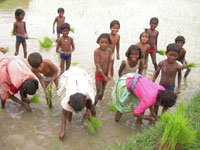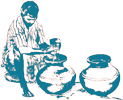resources: education
Education and Change among the Tribal Peoples of Jharkhand
Posted on: May 25, 2005.
Modified on:
By James Toppo, S.J.
... cont'd from page 1.
 This is how it all happened. Men, women and grown-up children of all five villages under the Jamindar, were to transplant paddy on his fields. All the ploughs of every household, irrespective of the family or personal problems, in good health or bad, had to be on the fields of the landlord – ploughing and preparing the inundated fields for immediate transplantation.
This is how it all happened. Men, women and grown-up children of all five villages under the Jamindar, were to transplant paddy on his fields. All the ploughs of every household, irrespective of the family or personal problems, in good health or bad, had to be on the fields of the landlord – ploughing and preparing the inundated fields for immediate transplantation.
 All young men, married or unmarried, were to transfer paddy saplings from nursery to the fields. This was done through carry-sticks, with saplings balancing by the ropes on both ends. (It is done the same way even today.) All women, even those with babies in their arms, were to be in the slushy fields from day one. This was a work for which there was no remuneration, regardless of the days it might take.
All young men, married or unmarried, were to transfer paddy saplings from nursery to the fields. This was done through carry-sticks, with saplings balancing by the ropes on both ends. (It is done the same way even today.) All women, even those with babies in their arms, were to be in the slushy fields from day one. This was a work for which there was no remuneration, regardless of the days it might take.
 Jamindar’s transplantation was the official beginning of the season for the entire locality. No raiyat was to enter his own field until this state duty, the most important task of the year, was fulfilled. For the families with no cowherds, the cattle would remain tied in the cowsheds all day. Babies had to be tied on their mothers’ back. Else they would be left on the mothers' leafy rain covers-turned-mats on the wet upper fields, avoiding water puddles. If not attended by older siblings, they would be left alone to whimper, cry and wail.
Jamindar’s transplantation was the official beginning of the season for the entire locality. No raiyat was to enter his own field until this state duty, the most important task of the year, was fulfilled. For the families with no cowherds, the cattle would remain tied in the cowsheds all day. Babies had to be tied on their mothers’ back. Else they would be left on the mothers' leafy rain covers-turned-mats on the wet upper fields, avoiding water puddles. If not attended by older siblings, they would be left alone to whimper, cry and wail.
A very hard working and conscientious young man of 20 in the fateful year of the homicide incident, my grandfather carried unusually heavy loads of saplings, because the women doing the transplantation outnumbered the men who supplied saplings. Worse, the nursary was about a kilometre away.
The monotony of sapling carrying trips would be punctuated with tobacco sharing respites. Men would stop on their tracks to rub tobacco between their palms, while their carry-sticks with sharp metallic ends would be vertically planted on the wet ground. After sharing the tobacco and a joke or two, they would resume work.
The Jamindar's supervisor on horseback however was not amused by such respites. He cracked a whip on the tobacco rubbing young man, yelling obscenities to the effect of "This is not the time for chewing tobacco. Hurry up, you lazy blocke!" For an honest, hard working young man this insult from a parasite was even more offensive than the cracking whip. That too, when he was slogging without a morsel of food that morning. Slogging for free.
From that point on everything happened as though in a flash. Like an eagle that descends on its prey in one fell swoop, my grandfather pulled out a carry-stick and hurled it towards the rider, striking him off the horse. In a fit of rage, he stabbed the supervisor's body two or three times with the carry-stick, leaving him growning in a pool of blood. When the wits finally returned to my grandfather, he fled. So did his companions.
When the first War of Independence, the Sepoy Mutiny, broke out in 1857, the tribal world was still covered in the shadows of total marginalisation and primitivism. It was not a matter of a few families here and there, but of a whole “nation”, spanning an area of 43,722 square miles.
Taking advantage of the forest cover, my grandfather sped through hills and dales, unknown territories and unfamiliar riverbanks till he found himself in the kingdom of another raja, some 40 miles away. Later he worked there on daily wages in various households till someone, also a tribal, hired him as a permanent agricultural labourer, since the new master knew he was a homeless vagabond. In the course of five years with his new master, my grandfather cleared a big patch of forest land and re-established himself with a family, never daring to inquire what might have happened to his siblings back home.
My grandfather's episode is but a glimpse of the exploitative and oppressive situation the tribals of Chotanagpur were hemmed in during the latter part of the 19th century, when the first War of Independence, regarded as the sign of great Indian awakening, occured. The tribal world was still covered in the shadows of total marginalisation and primitivism. It was not a matter of a few families here and there, but of a whole "nation", spanning an area of 43,722 square miles.
Was it my grandfather's revolutionary spirit that inspired his son, my father -- barely 10, the youngest of eight children -- to enroll in a school in Ranchi, three-day walk away, I wonder. Picture this: Three days' walk may roughly compute to 120 km. That too through endless forest tracts, infested with all dangers of the wild.
 "Handiya" or rice beer in earthen pot is a popular local brew in Chotanagpur. Indeed, hardly any celebration would be complete without it. Excessive consumption of it is also a regrettably common sight.
"Handiya" or rice beer in earthen pot is a popular local brew in Chotanagpur. Indeed, hardly any celebration would be complete without it. Excessive consumption of it is also a regrettably common sight. "In addition to perpetuating the ills of Bihar, no suitable education policy to emancipate the tribals and backward classes has been worked out, despite several years of autonomy."
"In addition to perpetuating the ills of Bihar, no suitable education policy to emancipate the tribals and backward classes has been worked out, despite several years of autonomy."



 This is how it all happened. Men, women and grown-up children of all five villages under the Jamindar, were to transplant paddy on his fields. All the ploughs of every household, irrespective of the family or personal problems, in good health or bad, had to be on the fields of the landlord – ploughing and preparing the inundated fields for immediate transplantation.
This is how it all happened. Men, women and grown-up children of all five villages under the Jamindar, were to transplant paddy on his fields. All the ploughs of every household, irrespective of the family or personal problems, in good health or bad, had to be on the fields of the landlord – ploughing and preparing the inundated fields for immediate transplantation. All young men, married or unmarried, were to transfer paddy saplings from nursery to the fields. This was done through carry-sticks, with saplings balancing by the ropes on both ends. (It is done the same way even today.) All women, even those with babies in their arms, were to be in the slushy fields from day one. This was a work for which there was no remuneration, regardless of the days it might take.
All young men, married or unmarried, were to transfer paddy saplings from nursery to the fields. This was done through carry-sticks, with saplings balancing by the ropes on both ends. (It is done the same way even today.) All women, even those with babies in their arms, were to be in the slushy fields from day one. This was a work for which there was no remuneration, regardless of the days it might take. Jamindar’s transplantation was the official beginning of the season for the entire locality. No raiyat was to enter his own field until this state duty, the most important task of the year, was fulfilled. For the families with no cowherds, the cattle would remain tied in the cowsheds all day. Babies had to be tied on their mothers’ back. Else they would be left on the mothers' leafy rain covers-turned-mats on the wet upper fields, avoiding water puddles. If not attended by older siblings, they would be left alone to whimper, cry and wail.
Jamindar’s transplantation was the official beginning of the season for the entire locality. No raiyat was to enter his own field until this state duty, the most important task of the year, was fulfilled. For the families with no cowherds, the cattle would remain tied in the cowsheds all day. Babies had to be tied on their mothers’ back. Else they would be left on the mothers' leafy rain covers-turned-mats on the wet upper fields, avoiding water puddles. If not attended by older siblings, they would be left alone to whimper, cry and wail.